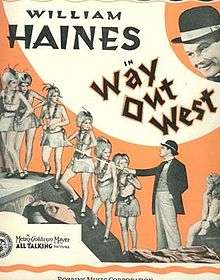Way Out West (1930 film)
| Way Out West | |
|---|---|
 Theatrical release poster | |
| Directed by | Fred Niblo |
| Screenplay by |
Joseph Farnham Byron Morgan Ralph Spence |
| Story by | Byron Morgan |
| Starring |
William Haines Leila Hyams Polly Moran Ralph Bushman |
| Music by | Joseph Meyer |
| Cinematography | Henry Sharp |
| Edited by |
Jerome Thoms William S. Gray |
Production company | |
| Distributed by | Metro-Goldwyn-Mayer |
Release dates |
|
Running time | 71 minutes[1] |
| Country | United States |
| Language | English |
| Budget | $413,000 |
| Box office | $497,000 |
Way Out West is a 1930 American comedy film. It tells the story of "Windy", a con man who cheats a group of cowboys out of their money. When they discover his cheating and learn that he himself has been robbed, they force him to work on a ranch until he has paid his debt. Way Out West stars William Haines, Leila Hyams, Polly Moran and Ralph Bushman and was directed by Fred Niblo.
Plot
Windy, a sideshow barker, cheats a group of cowboys out of their pay but is then robbed himself. When the cowboys discover they have been cheated they initially decide to hang him, then decide to make him work off his debt. He falls in love with ranch owner Molly and, when he saves her life after she is bitten by a snake, he wins her heart.[2]
Cast
- William Haines as Windy
- Leila Hyams as Molly Rankin
- Polly Moran as Pansy
- Cliff Edwards as Trilby
- Ralph Bushman as Steve (as Francis X. Bushman Jr.)
- Vera Marshe as La Belle Rosa
- Charles Middleton as Buck Rankin
- Jack Pennick as Pete
- Buddy Roosevelt as Tex
- Jay Wilsey as Hank
Production
Way Out West was made on a budget of $413,000, one of the most expensive William Haines vehicles.[3]
Response
The New York Times deemed Way Out West "an impertinent, moderately comic affair tinctured with slapstick and romance".[2] The film made a profit of $84,000, making it one of the least profitable of Haines's films of the period.[3]
Gay film historians, noting the homosexuality of William Haines, suggest that Way Out West is "one of the gayest films ever made".[4] Haines biographer William J. Mann cites latent homoeroticism and inside gay humor throughout the film. In one particular example, viewed in light of the Pansy Craze that was beginning to reach Hollywood, Windy is mistaken for the cook, Pansy. When called by her name he replies, "I'm the wildest pansy you ever picked!"[5] Richard Barrios, author of Screened Out: Playing Gay in Hollywood from Edison to Stonewall, concurs, writing, "For anyone seeking gay text or subtext in any of Haines's movies, this is the one to study."[6]
Notes
- ↑ Way Out West (1930)
- 1 2 THE SCREEN; Triumphant Impudence.
- 1 2 Mann (1998), p. 169
- ↑ Mann (2004), p. 161
- ↑ Mann (1998), pp. 167—68
- ↑ Barrios, pp. 47—8
References
- Barrios, Richard (2003). Screened Out: Playing Gay in Hollywood from Edison to Stonewall. Psychology Press. ISBN 0-415-92328-X.
- Mann, William J. (1998). Wisecracker: The Life and Times of William Haines, Hollywood's First Openly Gay Star. New York, Penguin Putnam. ISBN 0-670-87155-9.
- Mann, William J. (2004). Gay Pride: A Celebration of All Things Gay and Lesbian. Citadel Press. ISBN 0-8065-2563-0.